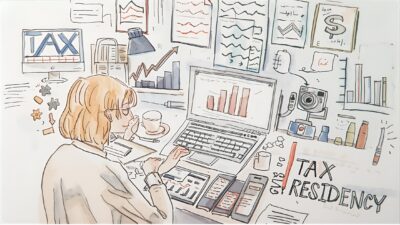Long-term visas are great for digital nomads. They offer the chance to live and work legally in another country while experiencing new cultures and lifestyles. For remote workers, these visas provide stability and a legal framework to enjoy extended stays abroad. However, these visas can come with hidden tax costs. Knowing the tax rules can save you from unexpected expenses. This article explains how these visas can make you a tax resident and gives tips to avoid tax problems.
How Long-Term Visas Can Make You a Tax Resident
Many countries use something called the 183-day rule. This rule is used to determine if someone has spent enough time in a country to be considered a tax resident. If you stay in a country for more than 183 days in a year, you might become a tax resident there. Long-term visas, which let you stay for a year or more, can increase the chances of this happening.
What It Means to Be a Tax Resident:
- You might have to pay taxes on all your income, even money you earn from other countries.
- You might need to file taxes, even if your job isn’t based in that country.
- You could face double taxation if your home country also taxes you.
Some popular long-term visas include specific tax rules. For example:
- Portugal’s D7 Visa: You must become a tax resident, but the Non-Habitual Residency (NHR) program offers some tax breaks.
- Barbados Welcome Stamp: No local taxes, but you still have to follow your home country’s tax rules.
- Croatia’s Digital Nomad Visa: Temporary tax exemptions may apply, but only under certain conditions.
Tips to Avoid Extra Taxes
Digital nomads can take steps to avoid tax surprises. These tips can help you follow the rules and lower your tax costs:
1. Learn About Local Tax Rules
Before you get a visa, research the tax laws in that country. Some places have tax treaties to prevent you from paying taxes twice. For example, the U.S. has treaties with countries like Germany and France, which define how income should be taxed to avoid double taxation. Similarly, Australia’s agreements with New Zealand and Singapore provide clear tax guidelines for expats.
2. Track How Long You Stay
Keep a record of how many days you spend in each country. If you stay less than 183 days, you might avoid becoming a tax resident. Use apps or simple spreadsheets to track your travel.
3. Look for Tax-Friendly Visas
Some visas are designed to reduce tax worries for digital nomads:
- Estonia Digital Nomad Visa: Short stays mean no tax residency.
- Dubai Remote Work Visa: No income tax in the UAE.
- Costa Rica Rentista Visa: No local taxes on money earned abroad.
4. Use Tax Treaties
Tax treaties between countries can help lower your tax bill. Check if your home country has a treaty with your destination. These treaties decide which country gets to tax you.
5. Get Help from a Tax Expert
Talk to a tax advisor who knows international tax rules. Finding someone with experience in digital nomad taxation is especially important, as they can offer tailored advice for your unique situation. They can help you organize your income to lower your taxes. They can also help you file taxes in different countries.
6. Choose a Tax Home
Keep a main tax residence in a low-tax country. This can help you avoid paying high taxes in other places while still following your home country’s rules.
Countries with Tax-Friendly Visas for Digital Nomads
Some countries make it easier for digital nomads to avoid heavy taxes:
- Georgia: No taxes if you stay less than 183 days.
- Mexico: Foreign income is not taxed for temporary residents.
- Barbados: No local taxes on income earned outside the country.
These countries offer great options for living abroad without paying extra taxes. But always double-check the rules for your situation. Choosing tax-friendly destinations allows nomads to focus on their lifestyle without unnecessary financial stress.
Conclusion
Long-term visas give you freedom and adventure, but they can also bring tax costs. Knowing how tax residency works is very important for digital nomads. By keeping track of your time, using tax treaties, and getting expert help, you can avoid tax problems. Pick your destinations wisely and plan ahead to make the most of your nomadic life.
Disclaimer: This article is for informational purposes only and does not constitute legal, tax, or financial advice. Consult a qualified tax advisor for guidance tailored to your situation.





